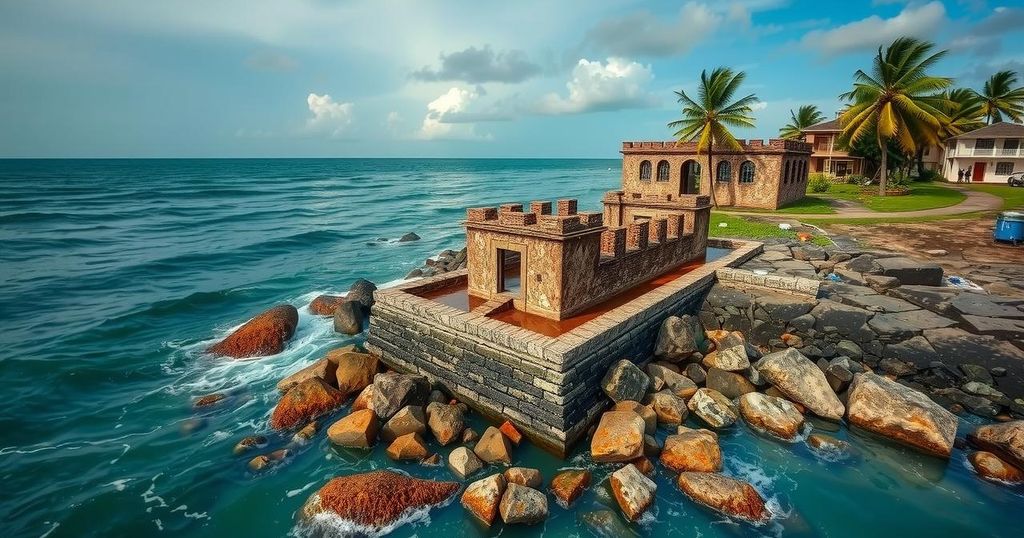Ghana is losing historic coastal forts and communities to climate change, with estimates indicating an annual erosion of two meters and significant flooding risks. Fort Prinzenstein and others have suffered devastating damage, while responsive measures include the construction of defense walls and resilience projects funded by international bodies.
Ghana is facing a significant loss of its historic forts along the 550-kilometer coastline, primarily due to severe tidal waves emanating from the Atlantic Ocean. Coastal communities are also in peril, as they face the threat of disappearance from the same forces. The Institute for Environment and Sanitation Studies estimates that the country experiences an average erosion rate of two meters annually, with certain locations suffering losses of up to 17 meters. The rising sea levels attributed to climate change endanger not just the livelihoods of vulnerable coastal communities but also the preservation of Ghana’s historic slave forts and castles. Among these is the 240-year-old Fort Prinzenstein in Keta, which has sustained a decade of damage, with approximately two-thirds of the structure now submerged. James Ocloo Akorli, the fort’s caretaker, highlighted, “Eight of its ten dungeons, originally built to hold enslaved Africans during the trans-Atlantic slave trade, were completely submerged before a sea defense wall was erected to protect what remains of the monument.” Similarly, Fort Kongenstein and Fort Fredensborg have succumbed to tidal forces, erasing their traces from the landscape. The plight of coastal communities is exacerbated by the advance of the ocean. Former resident Akorli Simon recounted the fate of Fuveme, stating, “The Sea began swallowing our community. We were devastated and had to abandon Fuveme in 2016 after a powerful tidal surge washed away the land.” In the Western Region, communities like Anlo village have dwindled to mere fragments, trapped between the encroaching sea and adjacent lagoons. Responsive measures are ongoing, including the construction of the Keta Sea Defence Wall, which spans 8.3 kilometers, funded by the United States Export-Import Bank at a cost of $94 million. Additionally, the West Africa Coastal Areas Resilience Investment Project seeks to bolster Ghana’s coastal resilience, with a budget of $155 million financed by the World Bank, targeting vulnerable ecosystems in critical areas such as the Korle Lagoon and the Densu Basin. In summary, the state of Ghana’s coastal heritage and communities is dire, as rising tides linked to climate change threaten both historical structures and the very existence of coastal populations.
The article discusses the alarming impact of climate change on Ghana’s coastline, specifically the loss of historic forts and the displacement of coastal communities due to rising sea levels and aggressive tidal waves. It highlights the urgent need for intervention to address the challenges posed by coastal erosion and the risks to cultural heritage sites. The context of historical significance is underscored, particularly regarding the forts that served during the trans-Atlantic slave trade, which face imminent danger of being lost to the ocean.
In conclusion, Ghana’s coastal erosion presents a dual threat to its historical forts and the survival of coastal communities. The ongoing efforts to combat this crisis, including the construction of defense walls and investment projects, are crucial in preserving both the tangible heritage of the country and the livelihoods of its people. The urgency of addressing climate change ramifications cannot be overstated, as it continues to jeopardize significant aspects of Ghana’s cultural and physical landscape.
Original Source: www.rfi.fr






